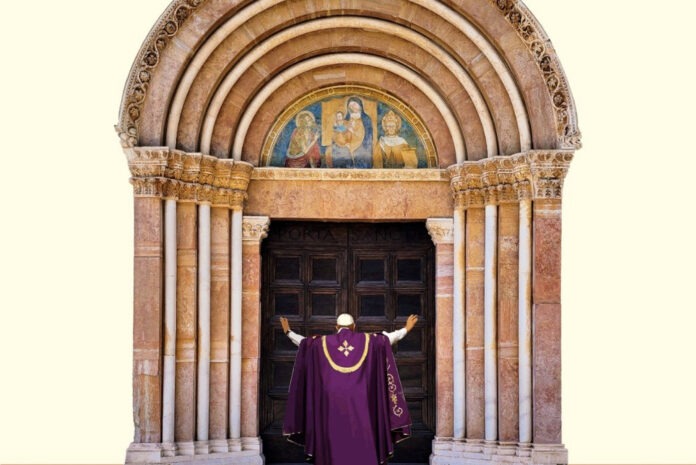The book was presented in the bookshop “Colacchi” very recently “The Popes and Celestine V” (L’Aquila, One Group, 2022), by Angelo De Nicola to his sixth work dedicated to the history and spirituality of Forgiveness. If the scientific discourse assigns an important part to experimentation in the advancement of knowledge, well, De Nicola can now boast of a expertising on the Celestine epic.
This is a real manual on the subject (including the preface of Giovanna Chiarilli and an introductory essay by don Luigi Maria Epicope), meticulously retracing facts, characters, ancient and posthumous situations on the disputed Pope, within the specola of thought that 24 popes and an antipope addressed to the Morronese. A very complex question in itself, which the author addresses, revealing how much Celestino V was in due proportion a casus for the Church.
In one word, we could state that Celestino V has the audacity to want to change the world by offering an interesting starting point which is “the change of ourselves”. Of course, the in-depth analysis on the successor of the renouncing pope to the Petrine throne should be emphasized, with all due respect to those who attribute to him the “great refusal” of Dante, the great poet present at the coronation of the Morronese hermit in Santa Maria di Collemaggio in August 1294.
Boniface VIII, if he tries to cancel the Bull “Inter sanctorum solemnia”safeguarded by the Aquilans, was not guilty of any crime against Pietro Angelerio (another legend that the author debunks to the sound of documents and medical studies, even unpublished …), thus canonized in 1313 by Clement V as a confessor and not a martyr as he wanted in his imperial design was King Philip IV the Fair, king of France and adversary of Benedetto Caetani.
Also, in the course of ecclesiastical history, it is interesting to see the role of other popes on the specific theme, so that Celestine V will also be sanctified as pope by Clement IX in 1668. Instead, in modernity Leo XIII, in 1896 on the sixth centenary of his death, composes an elegy in Latin for “Petre” and almost a century later, in the climacteric of the Second Vatican Council, the “rehabilitation” of the Abruzzese pope beginsthanks to Paul VI, who returned from Fumone, will place the Celestinian Forgiveness at the beginning of the Indulgences, perhaps on the advice of the Archbishop of L’Aquila from 1941-50 and Cardinal Carlo Confalonieri (the uncle of the Archbishop of Bologna and cardinal Matteo Zuppi who opened the Holy Door in Collemaggio in 2020 and is now President of the Italian Episcopal Commission).
Read also “Celestino V, was the” great refusal “really yours?”
If John Paul II, in his Aquila visit for the sixth centenary of the birth of the Holy preacher Bernardino of Siena, in 1980 could not avoid allusions to Celestine V, much is to be said of Benedict XVI, author of a sensational gesture in his coming to the Aquila, struck by the earthquake of April 6, 2009, because he laid his pallium on the “cenotaph of the Hermit”, not to mention that, in the nineteenth century from the birth of the humble friar, in Sulmona, the German pope revived the courage of the its distant predecessor.
Indeed, these are two prophetic situations three years after “Waiver” of Joseph Ratzinger to the office of Head of Catholicism and still susceptible to comparisons and intertwining with those who did it on 13 December 1294.
Following the leit motiv of the work, we reach the pope “who came from the end of the world” who demanded in the name of Mercy an Extraordinary Jubilee on the periphery of the world (in Bangui, capital of the Central African Republic) in 2015, and who will be the first pontiff in history to preside the opening of the Holy Door of Collemaggio (exceptionally, in the morning hour).
Pope Francis is in line with Celestine V, who gave the Indulgence to all without distinction, conversely to what was granted for those who went to “free” the Holy Land or the Franciscan Porziuncola of Assisi.
Edition no. 728 della Perdonanza, now also Unesco heritage, will therefore be in the sign of the 192 ° pope who on 2 April 2014 said “Jemo ‘nnanzi” (the motto of the homonymous city non-profit organization) to the community of L’Aquila, so aware that their social destinies they have been linked to the rite of Indulgence over the centuries.
Much still needs to be understood about the latest editorial work by Angelo De Nicola, for example on the canonical legitimacy of the resignation of a pontiff, however this is a task that falls to the “readers”, who will certainly be numerous.
by Enrico Cavalli
“The Popes and Celestine V”, the new book by Angelo De Nicola – The Walk of Fame




